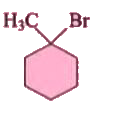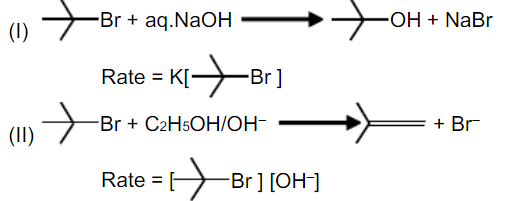which statement is/are correct for this reaction?
(I) polarity of solvent decreases then rate of reaction increases.
(II)strong nucleophilie is more suitable for this reaction.
(III) if R is bulky then carbocation become more stable.
(iv) racemisation take place in this reaction. 
I and II
II and IV
I,II and IV
III and IV
Step by step video & image solution for which statement is/are correct for this reaction? (I) polarity of solvent decreases then rate of reaction increases. (II)strong nucleophilie is more suitable for this reaction. (III) if R is bulky then carbocation become more stable. (iv) racemisation take place in this reaction. by Chemistry experts to help you in doubts & scoring excellent marks in Class 12 exams.
Updated on:21/07/2023Similar Questions
Knowledge Check
Which reaction take place at the fastest rate?
A B
B C
C D
D
Which of the following statement is correct? A)The rate of a reaction decreases with passage of time as the concentration of reactants decreases. B)The rate of a reaction is same at any time during the reaction C)The rate of a reaction is independent of temperature change D)The rate of a reaction decreases with increase in concentration of reactant(s)
AThe rate of a reaction decreases with passage of time as the concentration of reactants decreases.BThe rate of a reaction is same at any time during the reactionCThe rate of a reaction is independent of temperature changeDThe rate of a reaction decreases with increase in concentration of reactant(s)Aliphatic nucleophilic substitution is mainly of two type SN1 and SN2.SN2 reaction proceed with strong nucleophile in polar aprotic solvent. 3∘ halides do not give SN2 reaction. Inverted products are obtained in this reaction and mechanism of reaction occurs through the formation of transition state.
SN1 reaction proceed through the formation of carbocation in polar aprotic solvent. Solvent itself acts as nucleophile in this reaction. Racemization takes place in SN1 reaction.
Which one of the following will give racemised product in C2H5OH ?AH3C−C∣CH3H−BrBPh−CH3∣C∣CH3−ClCPh−CH3∣C∣H−ClD
Which reaction gives more products as a result of increase in pressure :
View SolutionAssertion (A) : Poistive catalysts increase the rate of reaction.
Reason (R ): Catalysts decrease the value of ΔGɵ.
View SolutionWhich represents first order reaction out of I, II and III?

View SolutionFor the reaction
5Br−(aq)+BrO−3(aq)+6H+(aq)→3Br2(aq)+3H2O(l)
the reate expression was found to be −d[BrO3−]dt=k[Br−][H+]2[BrO−3]
Which of the following statements is /are correct?
I. Doubling the intial concentration of all the reactants will increase the reaction rate by a factor of 8.
II. Unit of rate constant of the reaction in a buffer solution is min−1
III. Doubling the concentration of all the reactants at the same time will increase the reaction rate by a factor of 16
IV. rate of conversion of BrO−3 and rate of disappearance of Br− are the same
View SolutionCarboxylic acid, although unreactive to alcohols, reacts in the presence of small amount of conc.H2SO4 or with 2−3% of HCl ?
RCOOH+R'OHH⊕⇐⇒RCOOR'+H2O
Which of the following statements is//are correct about the above reaction ?
(I) This reaction is called Fischer esterification reaction.
(II) The equilibrium is shifted to R.H.S if H2O is removed by azeotropic distillation with benzene.
(III) The reaction of RCOCl and R'OH to give ester (RCOOR') is irreversible and more feasible than esterification of RCOOH.
(IV) If the above esterification of RCOOH is carried out in excess of R'OH, the equilibrium is shifted to R.H.S.
View Solution

